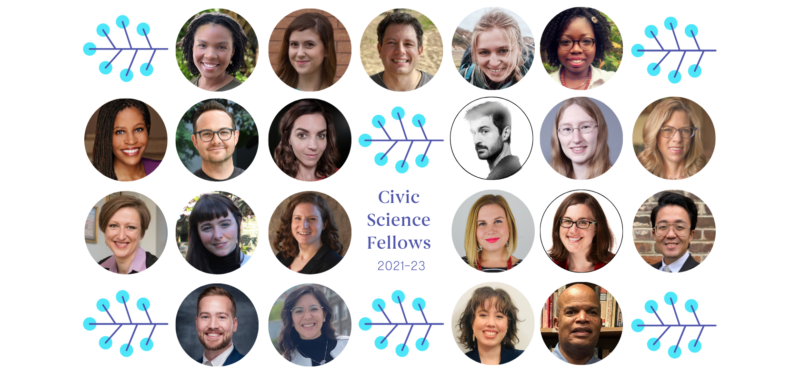
Stories

Meet the 2021-23 Civic Science Fellows
Pioneering civic science initiative announces 21 leaders from diverse demographic, cultural, and professional backgrounds who will join a community working to strengthen the role of science in public life.
The 2021-23 Civic Science Fellows program—designed to create new partnerships, practices, and knowledge to advance meaningful, inclusive engagement on issues at the interface of science and society—has announced its new class of Fellows.
Through their expertise in science, media, education, civic engagement, and other fields, the 21 Fellows in the 2021-23 cohort, supported by 35 pioneering funders and host partners, will work to forge new relationships between science and diverse communities, using a variety of innovative, evidence-based approaches. To undertake this work, the Fellows will be embedded for 18 months within organizations that prioritize strengthening the links between science and society, delving into questions about creating and communicating knowledge; designing for equity and inclusion; and scaling up networks and collective action for impact.
The Civic Science Fellows program, supported by foundations, scientific associations, researchers, civic institutions, and media organizations, is investing in leaders who work intentionally to create new partnerships and approaches to develop inclusive and effective problem-solving using science and technology.Recognizing that making progress toward a culture of civic science will require building new knowledge, new forms of collaboration, and new ways of working across many different disciplines and sectors, the Civic Science Fellows program is creating a community of diverse change agents to build and foster this mindset of collaboration between science and society.
The 2021‑23 Civic Science Fellows:
Agora Institute Civic Science Fellow
Lia Kelinsky-Jones
Project focus: Lia will co-lead and co-design a research initiative to map policy engagement activities based at colleges and universities across the United States. This mapping will provide a unique lens into what’s happening on the ground across the country, thus informing understanding and recommendations about what’s working and what’s not.
APLU Civic Science Fellow
Elyse Aurbach
Project focus: In collaboration with the Association of Public and Land-grant Universities and the University of Michigan, Elyse will help to address how to modernize scholarship to provide visibility, reward, and advancement to faculty and staff engaging the public in scientific projects to serve societal needs.
Aspen Institute Civic Science Fellow
Jylana L. Sheats
Project focus: Jylana will co-design and co-manage the “Our Future is Science” initiative in close partnership with the Aspen Institute and Coda Societies to spark passion, confidence, and curiosity about science for high-school-aged Black, Indigenous, and People of Color (BIPOC).
ASTC Civic Science Fellow
Laura Bartock
Project focus: Laura will connect and support Association of Science and Technology Centers (ASTC) members in building capacity for community science programs, including developing a virtual training program, building a toolkit of resources, and establishing a community of practice for exchange and learning.
Boston University Civic Science Fellow
Michelle A. Amazeen
Project focus: Michelle will investigate science-related misinformation in social and online media and how audiences interact with it, as well as develop and test potential interventions.
Dana Foundation Barbara Gill Civic Science Fellow
Claire Weichselbaum
Project focus: Claire will focus on public engagement in the ethics of emerging research and development in neuroscience at the National Informal STEM Education (NISE) Network, working with collaborators to develop pilot engagement, directions for the future, and pathways to policymaker engagement.
Johns Hopkins Berman Institute of Bioethics Civic Science Fellow
Lomax Boyd
Project focus: Lomax will focus on ethics, science, and society, including seeking a pathway to responsible creation and use of neural organoids that accounts for and incorporates public perception, as well as the ethical and policy implications of the technology.
The Brinson Foundation Civic Science Fellow
Eric Jensen
Project focus: At the National Center for Supercomputing Applications (NCSA), Eric will codify effective approaches to scientific visualization and gain a more thorough understanding of which design choices most significantly impact audience perception and interest in science topics.
Ciencia Puerto Rico Civic Science Fellow
Andrea Isabel López
Project focus: Andrea will help to evaluate the impact of CienciaPR’s culturally relevant strategies across programs, understand how CienciaPR’s work can be a model to advance civic science, and strategize to increase the organization’s capacity to train more scientists in culturally relevant strategies and foster civic participation.
EDGI Civic Science Fellow
Kelsey Breseman
Project focus: Kelsey, in collaboration with EDGI Civic Science Fellow Mark Milton Chambers, will focus on environmental data governance and justice, exploring models for tailoring federal environmental data to the needs of communities.
EDGI Civic Science Fellow
Mark Milton Chambers
Project focus: Mark, in collaboration with EDGI Civic Science Fellow Kelsey Breseman, will focus on environmental data governance and justice, exploring models for tailoring federal environmental data to the needs of communities.
John Templeton Foundation Civic Science Fellow
Nicole Krause
Project focus: Based at Science, Media, and the Public Research Group at the University of Wisconsin–Madison, Nicole will work to understand interactions between scientific information and human values in polarized cultures and examine how the science of science communication can help develop more effective strategies for communities of practice to connect with conservative and/or religious audiences.
National Academies Civic Science Fellow
Angela Fenoglio
Project focus: Angela will co-design projects, building on work that engages the growing community of practice centering collaborative engagement with communities around science, as well as synthesizing research on timely topics in science communication for practitioner audiences.
National Geographic Civic Science Fellow
Álvaro Laiz
Project focus: Álvaro will explore narrative, traditional culture, nature, and tech to identify ways to illuminate and protect the wonders of the world.
Open Environmental Data Project Civic Science Fellow
Emelia Williams
Project focus: Emelia will focus on the open data and governance ecosystem, working collaboratively to identify and articulate new strategies for data usability, governance, and inclusiveness in practice.
ORFG Civic Science Fellow
Eunice Mercado-Lara
Project focus: In collaboration with the Health Research Alliance, Eunice will work toward increasing both openness and equity within funding programs by helping to develop, launch, and oversee an Open and Equitable Model Funding Program to address inequities in the research community.
ScienceCounts Civic Science Fellow
Michelle Race
Project focus: Michelle will help design, implement, and evaluate a novel engagement program involving an underrepresented or marginalized community.
Science News Civic Science Fellow
Martina G. Efeyini
Project focus: Martina will work to help understand how to better engage with young people through science journalism, particularly those historically underrepresented in science, including people of color and those in low-income urban and rural areas.
Science Philanthropy Alliance Civic Science Fellow
Daren Ginete
Project focus: Daren will explore how philanthropy can help build a more diverse, equitable, and inclusive research enterprise, and what opportunities lie ahead for philanthropists as a growing number recognize the influence of systemic racism and discrimination on their work.
Sigma Xi Civic Science Fellow
Andrew George
Project focus: Andrew will develop a digital platform for fostering effective, sustainable collaborations between scientists and policymakers to address the needs of communities, initially within the state of North Carolina.
Shorenstein Center Civic Science Fellow
Julia Minson
Project focus: Julia will focus on understanding the conditions that make people willing to listen and be receptive to views and opinions they strongly oppose on political and social topics related to science.
About the Civic Science Fellows Program
Civic Science Fellows are emerging leaders from diverse demographic, cultural, and professional backgrounds. They are thought leaders, bridge builders, change agents, and communicators working to learn about community priorities and scientific research and bring those worlds together on equal footing to create fundamentally new ways of solving problems. Designed to create new partnerships, practices, and knowledge to advance meaningful, inclusive engagement on issues at the interface of science and society, the Civic Science Fellows program was established with a 2020-21 cohort, with initial support from the Rita Allen Foundation, Burroughs Wellcome Fund, Kavli Foundation, Gordon and Betty Moore Foundation, and David and Lucile Packard Foundation. Go to civicsciencefellows.org to learn more.
Maria Balinska, Executive Director, Fulbright Commission:
“Narratives and storytelling are key to furthering public understanding of, and engagement with, complex scientific and social issues. That’s why we are so excited to be working with our partner the University of Oregon’s Center for Science Communication Research, to create a fellowship opportunity that will expand and promote reporting on civic science.”
France Córdova, President, Science Philanthropy Alliance:
“It’s a privilege to once again be a host partner for the Civic Science Fellows program. The fellowship class represents the diverse, multi-disciplinary leadership needed to better connect science and society. As a community of funders, the Alliance is committed to exploring and supporting philanthropy’s role in that effort.”
James DeVaney, Founding Executive Director, Center for Academic Innovation; Associate Vice Provost, University of Michigan:
“The Center for Academic Innovation is excited to partner with APLU to co-host Dr. Aurbach, and we look forward to serving as a hub from which to convene university partners and other institutions to address key questions in how to recognize faculty and staff for their contributions to public engagement, DEIJ, and other approaches to public impact.”
Mariette DiChristina, Dean, Boston University’s College of Communication:
“Misinformation is one of the critical communication challenges of our time, threatening society’s ability to build understanding on key issues. We are excited about Civic Science Fellow and Associate Professor Michelle Amazeen’s research to find productive approaches to address this problem.”
Sam Gill, President, Doris Duke Charitable Foundation:
“From COVID to climate change, the connection between science and society is under strain like never before. These fellows are at the forefront of ensuring science remains useful and responsive to a society in crisis.”
Adam Seth Levine, SNF Agora Associate Professor of Health Policy & Management, Johns Hopkins Bloomberg School of Public Health:
“Lia is at the forefront of a new generation of scholars committed to using scientific evidence to make policy more effective and more equitable. We are thrilled that she’s leading this new mapping project!”
Kacy Redd, Associate Vice President, Research & STEM Education, Association of Public and Land-grant Universities:
“We are excited to host Dr. Elyse Aurbach, who brings a deep commitment to public engagement. Her project at APLU on Modernizing Scholarship for the Public Good will contribute to a national dialogue on what is needed to support faculty and staff involved with Cooperative Extension and who conduct public engagement and public impact research activities at public research universities.”